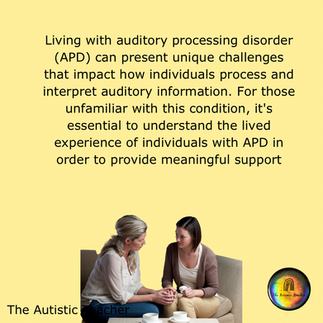
Experiencing Auditory Processing Disorder
- mandycook2021
- Jan 20, 2024
- 3 min read
Updated: Jan 21, 2024
It is said that up to 80% of autistic people also have auditory processing disorder. Many of them don’t even realise. For me, I thought everyone heard what I hear! But I could never understand the appeal of eating in a restaurant or going to a pub… I would spend the evening trying to work out what people were saying. It was exhausting, embarrassing and not at all the joyful event that other people seemed to experience. I had no idea why.
Living with auditory processing disorder (APD) can present unique challenges that impact how individuals process and interpret auditory information. For those unfamiliar with this condition, it's essential to understand the lived experience of individuals with APD in order to provide meaningful support.
Imagine being in a crowded room. The chatter and background noise blend together, making it difficult to discern individual voices or follow a conversation. It’s impossible to filter out the noises that you don’t want to hear. I hear everything all at the same time. This is a glimpse into the daily struggle faced by individuals with APD. For them, processing and making sense of auditory input isn't as seamless as it is for others.
The experience of APD can be overwhelming. Imagine feeling lost in a sea of sounds, where distinguishing speech from background noise becomes a constant battle. Simple tasks, such as following verbal instructions, participating in group discussions, or processing rapidly delivered information, can become a source of frustration and anxiety.
Individuals with APD may also encounter challenges with auditory memory, making it difficult to retain and recall verbal information. This can impact their ability to learn through traditional auditory-based instruction, potentially leading to feelings of inadequacy and self-doubt in academic and social settings. It’s always helpful to have things written down.
The struggle to effectively communicate and engage in conversations can also take a toll on mental and emotional well-being. Imagine feeling isolated and disconnected in social gatherings, where the effort required to process and respond to speech leaves individuals feeling mentally drained and misunderstood.
Moreover, the sensory overload experienced by some individuals with APD can lead to heightened sensitivity to certain sounds, contributing to stress and discomfort in noisy environments. This intensified sensory experience can further compound the challenges of navigating everyday situations, potentially leading to avoidance behaviours, heightened anxiety, meltdowns and shutdowns.
Understanding the experience of APD goes beyond acknowledging the tangible difficulties; it involves recognising the emotional impact of living with this condition. Imagine the frustration of wanting to participate fully in conversations, but struggling to keep up with the pace of dialogue. These experiences can lead to a sense of alienation and diminished self-confidence, highlighting the need for empathy and support from their peers, educators, and the broader community.
Despite these challenges, individuals with APD often exhibit remarkable determination. We often adapt and find strategies to navigate the auditory world. Visual cues, one-on-one conversations are often helpful. We may benefit from modifications in educational and work environments (eg written notes and summaries of conversations and instructions can help) to accommodate our unique auditory processing needs.
If you would like to support me…
Feel free to buy me a coffee… If you have enjoyed my work and would like to support me in my mission to help the Autistic Community, feel free to buy me a coffee. Please only donate if you can afford to do so. Everything given is very much appreciated. ❤️ Thank you!
You can also help to spread the word by liking, loving and sharing my posts. ☺️
The Autistic Teacher



























Comments